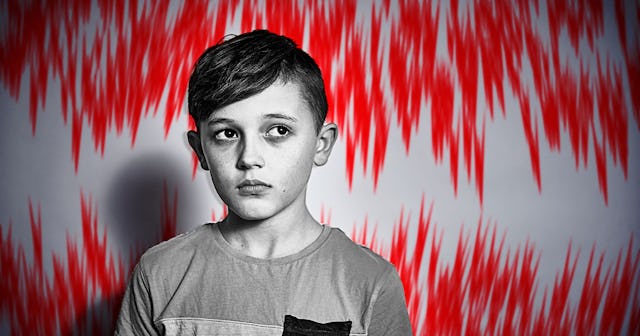My Kid Has Anxiety––And Now I Know What Not To Do

When one of my children was only four, the preschool teacher sent me a message. My child was constantly complaining about the noise in the classroom. It seemingly disturbed her more than other children their age. Then, in second grade, my child’s teacher told me they were tattling non-stop on other children for actions that weren’t tattle-worthy. My child also hated goodbyes. We’d have a wonderful playdate with family or friends, but when it came to saying goodbye, my child became (seemingly) rude. They would run off to their room, refusing to walk our guests to the door and give them a hug or high-five before leaving. Then there were the chronic stomach aches and relentless nail-biting.
I began putting two and two together. I was convinced my child had anxiety. We sought a psychological evaluation, and my suspicions were confirmed. Like me, my child was living with Generalized Anxiety Disorder. However, unlike me, my child wouldn’t go for years on end without help.
When I was young, my dad would leave for work very early in the morning. I’d wake up, hearing his car zip down our gravel driveway, and I’d pray that he wouldn’t get in a car accident. Living with anxiety means you’re always thinking about the worst-case possibility in any given situation. My go-to was to prepare myself for terrors that would never manifest.
I also had constant digestive issues, I was terrified to break the rules, and I hated chaos of any kind. My parents finally took me to the doctor when I was in middle school. The doctor ran all sorts of tests, all coming back normal. Exasperated with my list of seemingly random symptoms, the doctor suggested to my parents that I just needed a punching bag to work out my nervous energy.
My peers noticed my anxious tendencies and frequently told me I just needed to “calm down” and “chill out.” As you can imagine, I wasn’t always fun to hang out with. I was the rule-reminder and shusher. Yup, a real kill-joy.
I was officially diagnosed with anxiety in my thirties after years of panic attacks that would come and go. I went to therapy for the first time to begin to learn the necessary skills to deal with my anxiety disorder, and I also started medication. These, paired with healthy eating, exercise, meditation, prioritizing sleep and rest, and getting outdoors, have helped me manage my anxiety.
fstop123/Getty
I look back at my life and see all the wasted opportunities and joys. I was so busy trying to control every outcome and always being one step ahead that I never stopped to smell the proverbial roses. I didn’t have a name for my issue at the time, nor did I relate the various symptoms to a single cause. My muscles were always tight, my teeth clenched, my shoulders hiked up. I always knew where the bathrooms were located, in the likely case that I’d need to make a run for it during another one of my stomach aches.
I will absolutely not let my child be in this same position. When we suspected anxiety, we acted swiftly, finding a therapist, prioritizing exercise and journaling, and eventually considering medication. We also told our child what anxiety was and what it meant, firmly believing that a diagnosis is a starting-point and nothing to be ashamed of. When we name a problem, it’s much easier to work on solving.
The hardest parts of growing up with unnamed and untreated anxiety was the loneliness. I knew I was different, but my struggles were always blown off. I doubted myself. Why couldn’t I just get over being so rigid? Why was I so unhappy when I had a great life? Where was this proverbial “chill pill” everyone kept telling me to take?
Feeling alone meant learning, year after year, to only rely on myself. If I told someone else about my pain, or if I showed any signs of struggle, I would inevitably be mocked or dismissed. This, of course, just leads to being even more anxious. I wasn’t going to let this happen to my child. After all, I’ve now spent years trying to unlearn unhealthy coping mechanisms and challenge toxic thoughts.
I do owe my anxiety one thing: a thank you. Living with anxiety helped me catch my own child’s anxiety early on. Therefore, I’m able to work with them to manage the disorder, with confidence and experience, rather than let their anxiety run rampant for years on end. We also have the shared commonality of anxiety, which opens the doors to communication about what might help. There’s a sense of togetherness and teamwork which is comforting. Anxiety is a part of us, but it isn’t our entirety.
My child also sees me actively confronting and managing my anxiety disorder. I pray that I’m leading by example, teaching them that they can do the same. I also don’t hide the fact that there are days that I struggle, despite all the tools at my disposal and the skills I’ve acquired. I try to show my child that there are also unhealthy ways to cope, and we work to avoid those.
It’s not all doom and gloom. We have enjoyed meditating together and doing yoga videos. We’ve found a calming tea we brew at night, and we know that sunshine and fresh air is incredibly helpful. These activities, no matter how small, have solidified our parent-child bond. This is a win-win in my eyes.
Anxiety is a beast. It tries to steal our time and energy. We will continue to battle it, yet no matter how difficult anxiety can be, we will always have each other.
This article was originally published on